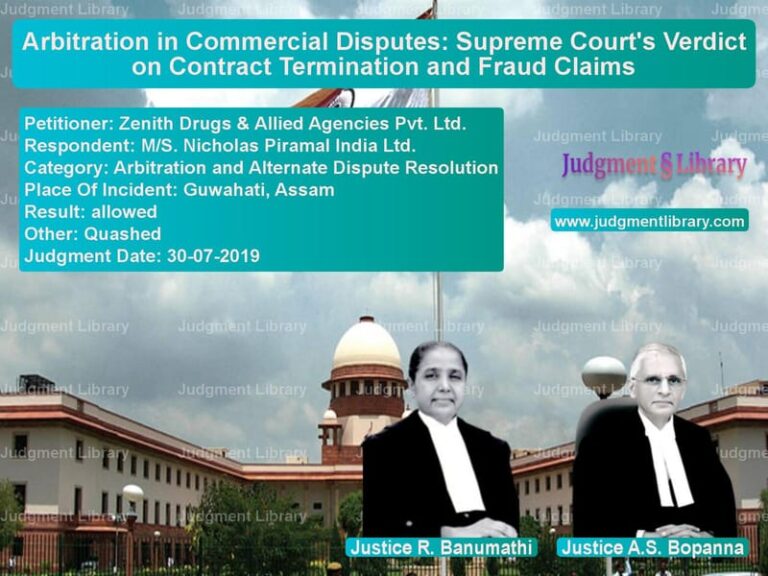Slum Rehabilitation and Housing Dispute: Supreme Court’s Landmark Judgment on Fair Allocation
In a landmark judgment, the Supreme Court of India addressed a crucial issue concerning slum rehabilitation in Mumbai. The case involved the dispute between slum dwellers and the Slum Rehabilitation Authority (SRA) regarding the allocation of tenements in a rehabilitation project. This ruling not only settled a long-standing dispute but also set an important precedent for slum redevelopment projects across India.
Background of the Case
Slum rehabilitation in Mumbai has been a complex and often controversial subject. The Maharashtra Slum Areas (Improvement, Clearance and Redevelopment) Act, 1971, provides a framework for upgrading slum areas and offering dignified housing to slum dwellers. Under this law, private developers collaborate with the government to build housing complexes, ensuring that eligible slum dwellers receive free tenements.
In this case, the Slum Rehabilitation Authority (SRA) undertook a rehabilitation project at Lower Parel, Mumbai. The scheme aimed to construct multiple towers to house displaced slum dwellers. However, a dispute arose when a group of slum dwellers challenged the manner in which the tenements were being allocated.
Key Issues in the Case
- Whether the agreement between the private developer and a section of slum dwellers was legally binding.
- Whether the lottery-based allotment system mandated by the SRA was fair and just.
- Whether a private Memorandum of Understanding (MoU) could override statutory procedures.
- Whether the petitioners had a vested right to demand specific flats based on prior agreements.
Arguments by the Petitioners
The petitioners, a group of slum dwellers, contended that they had entered into a private agreement with the developer. They claimed:
- They were promised specific flats in designated towers as per the MoU signed between them and the builder.
- The SRA’s decision to conduct a lottery for tenement allocation violated their rights.
- The agreement had granted them an enforceable right over particular units.
- The authorities’ deviation from the MoU amounted to a breach of trust.
Arguments by the Respondents
The respondents, including the State of Maharashtra and the Slum Rehabilitation Authority, countered that:
- The MoU was a private agreement and did not hold legal sanctity in the face of statutory regulations.
- The Development Control Regulations (DCR), 1991, mandated an impartial lottery-based system for the allotment of tenements.
- Allowing private agreements to dictate slum rehabilitation projects would lead to inconsistencies and favoritism.
- The scheme had to follow a transparent and fair method applicable to all beneficiaries.
Supreme Court’s Observations
After hearing both sides, the Supreme Court dismissed the petitioners’ claims and upheld the SRA’s decision. The Court made several important observations:
- “No slum rehabilitation project can be implemented in an arbitrary manner. The process of allotment must be conducted as per statutory requirements.”
- “A private contract cannot supersede the public interest served by a statutory scheme.”
- “The principle of fairness demands that tenement allotment should be conducted through an open lottery.”
- “The SRA’s authority to regulate such schemes is paramount and cannot be overridden by private arrangements.”
Impact of the Judgment
This ruling has several far-reaching consequences:
- It establishes that government-approved procedures take precedence over private agreements.
- It ensures fairness in the distribution of tenements in rehabilitation schemes.
- It prevents developers from engaging in preferential allotment based on private arrangements.
- It reinforces the authority of the Slum Rehabilitation Authority in implementing government housing policies.
Conclusion
The Supreme Court’s judgment upholds the integrity of slum rehabilitation laws in India. By rejecting private MoUs as a basis for allotment, the court has reinforced the importance of a statutory framework in urban redevelopment. The decision ensures that all beneficiaries of slum rehabilitation schemes receive equal treatment under the law.
Read also: https://judgmentlibrary.com/supreme-court-rules-on-nominee-rights-in-shares-succession-laws-prevail/
As slum redevelopment projects continue to expand across major cities, this judgment serves as a guiding principle for balancing private interests with public welfare.
Petitioner Name: Sayunkta Sangarsh Samiti & Anr..Respondent Name: The State of Maharashtra & Ors..Judgment By: Justice Sudhanshu Dhulia, Justice Aniruddha Bose.Place Of Incident: Lower Parel, Mumbai.Judgment Date: 14-12-2023.
Don’t miss out on the full details! Download the complete judgment in PDF format below and gain valuable insights instantly!
Download Judgment: sayunkta-sangarsh-sa-vs-the-state-of-maharas-supreme-court-of-india-judgment-dated-14-12-2023.pdf
Directly Download Judgment: Directly download this Judgment
See all petitions in Property Disputes
See all petitions in Landlord-Tenant Disputes
See all petitions in Specific Performance
See all petitions in Damages and Compensation
See all petitions in Judgment by Sudhanshu Dhulia
See all petitions in Judgment by Aniruddha Bose
See all petitions in dismissed
See all petitions in supreme court of India judgments December 2023
See all petitions in 2023 judgments
See all posts in Civil Cases Category
See all allowed petitions in Civil Cases Category
See all Dismissed petitions in Civil Cases Category
See all partially allowed petitions in Civil Cases Category







